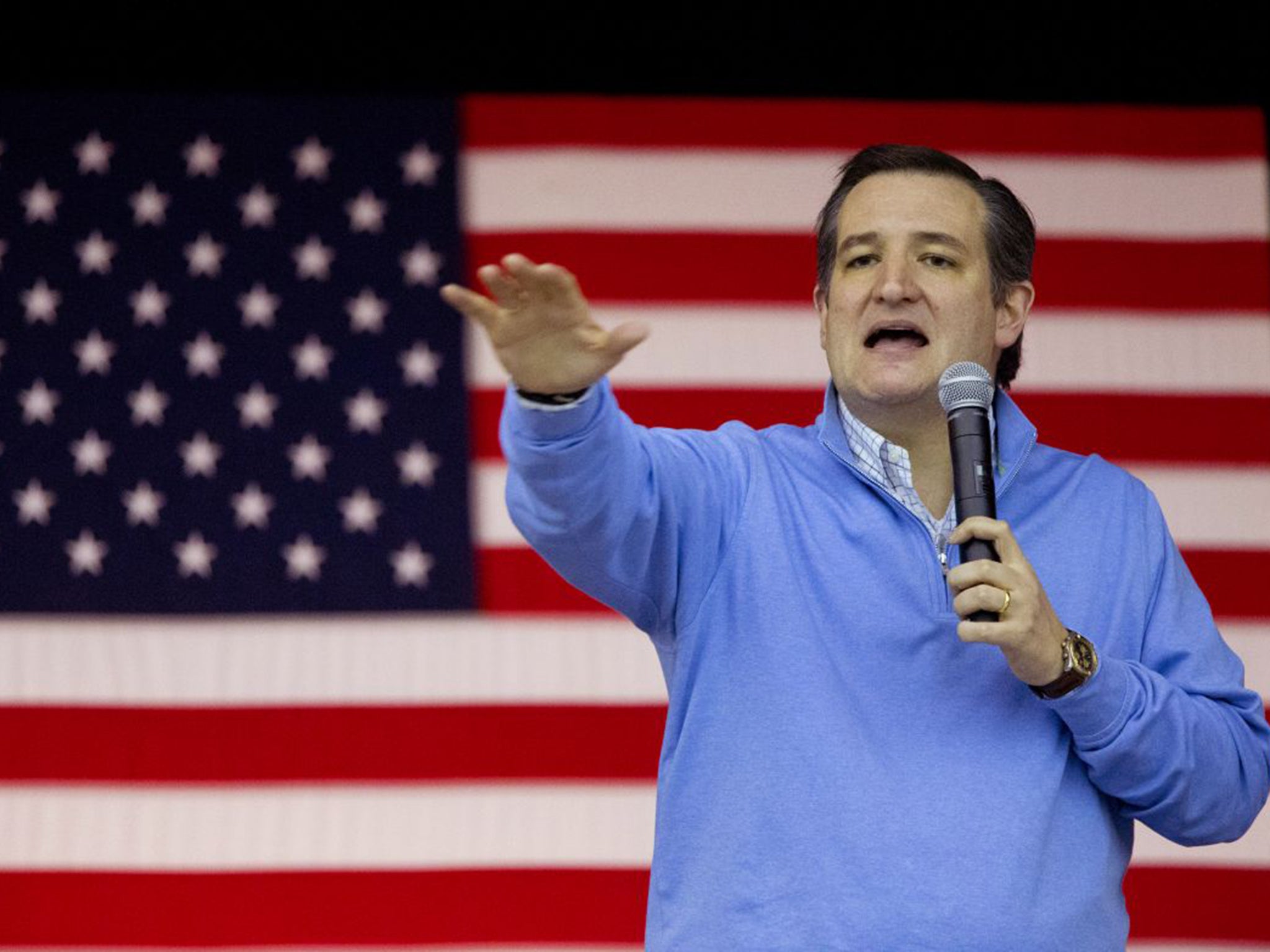US Election 2016: Ted Cruz faces his Rubicon in Iowa as he struggles to make himself likeable
'If you see Washington embracing any candidate, run and hide,' he declared

Maybe it's his mournful mien, but Ted Cruz looks whacked leaning against a pillar to the side of a kindergarten meal room in the small town of Hubbard, Iowa, smiling only on cue as his wife, Heidi, warms up the small crowd of mostly middle-aged voters sitting scrunched on kiddy-sized chairs.
When the microphone is finally his, the Senator from Texas who is better placed than anyone possibly to interrupt the Donald Trump juggernaut and claim first place in the Iowa caucuses in Iowa when voters across the state will express their preferences for presidential candidates from both parties, first attempts a joke, but it seems tired too. Heidi is perfect but for one thing. “Her eyesight is terrible,” he offers.
Making himself likeable is arguably the greatest challenge for Mr Cruz, 44, who, perhaps more than anyone in the field of 12 Republican runners, faces his Rubicon in this rural, Midwestern state. Squeeze past Trump and he will be able to claim as his the support of hard conservatives and evangelicals that he will need to gain momentum as the pace of the state-by-state nomination process accelerates.
On the other hand, not winning here could prove devastating to the young senator, who, since being sent to the US Senate on a Tea Party ticket in 2012, has won a reputation as the scourge not just of Washington but also of the establishment wing of his party. Both yearn for him to stumble here.
He wears their disdain with pride. That he has come as far as he has, overtaking Mr Trump is some polls in Iowa by a hair, it’s because he vows to take his fight to Washington to eviscerate the federal bureaucracy and block all and any efforts by his own party’s leadership to acquiesce to anything resembling compromise.
When Ronald Reagan was elected to suceed former Democratic President, Jimmy Carter, he too was disdained by Washington, he assures the 100-odd supporters in the room, who alternately hold up signs declaring ‘Vote for Cruz’ or ‘Don’t Believe the Liberal Media’.
“If you see Washington embracing any candidate, run and hide,” Mr Cruz declares. Summoning the energy his must-win situation requires, he offers a litany of actions he would take in his first days in office. It is a scorched-earth agenda, ranging from ending Obamacare, “ripping up” the Iran nuclear deal, undoing every “unconstitutional and illegal” executive action ever taken by President Obama and starting the process of abolishing the Internal Revenue Service and instituting a flat tax for all.
Two hours later, before a capacity crowd in a nearby Ames hotel, a more caffeinated Cruz takes the stage after being introduced by Glenn Beck, one time ultra-conservative siren of Fox News. “We will finally, finally, finally secure the borders,” he vows to loud applause, tapping into the same anti-immigration vein that has fed the Trump phenomenon. And he has a new joke: he recently lamened to a Texas farmer he can’t spray regulators with pesticide like locusts. The farmer said. “You wanna bet?”
But there is no concealing the pressure he is under. He has suddenly been forced to switch resources to Senator Marco Rubio of Florida, who has shown new strength in the last Iowa lap and has emerged as the best hope of party elders and mainstream donors for whom nuking Cruz and Trump is paramount.
Republican presidential nominations
Show all 9By most reckonings, it was Cruz who came out worst most damaged from the last debate on 28 January – the one Mr Trump skipped - not least for whining to moderators about the unrelenting challenges to him. It was Rubio that the Des Moines Register, the biggest Iowa paper, recently endorsed. On 30 January, The New York Times threw its weight among Republicans behind John Kasich, the Governor of Ohio.
Iowa offers a litmus test for the Cruz promise to rein in government. But it is one that carries huge risk. Unlike all his rivals, the senator is vowing to phase out a long-standing federal programme requiring the blending of ethanol in petrol in the United States. Ethanol is made from corn cobs. Corn cobs are the border-to-border carpeting of Iowa. Farmers love the programme that amounts to a giant subsidy.
In a departure from political decorum, Iowa Governor Terry Branstad, the longest serving governor in the history of the United States and a Republican, has flatly urged Iowans not to back the senator. “He could be very damaging to the state,” he told voters. It was a red rag to Cruz. And to his supporters.
“Everybody says they are a conservative when they are running but change when they get to Washington but Ted will do what he stands for,” insisted Howard Marsh, 59, a retired schools administrator who came to the Hubbard meeting. He scorns those calling for the ethanol subsidy to stay, including Branstad. “We all complain about Big Government and then line up at the trough.”
It will be a less mournful Cruz who salutes his supporters if he prevails here on Monday. But even then, history will hold a warning for him. The winners here in 2008 and 2012, Mike Huckabee and Rick Santorum, never grasped the big prize. This year they are back – at the very bottom of the pack.
Subscribe to Independent Premium to bookmark this article
Want to bookmark your favourite articles and stories to read or reference later? Start your Independent Premium subscription today.

Join our commenting forum
Join thought-provoking conversations, follow other Independent readers and see their replies